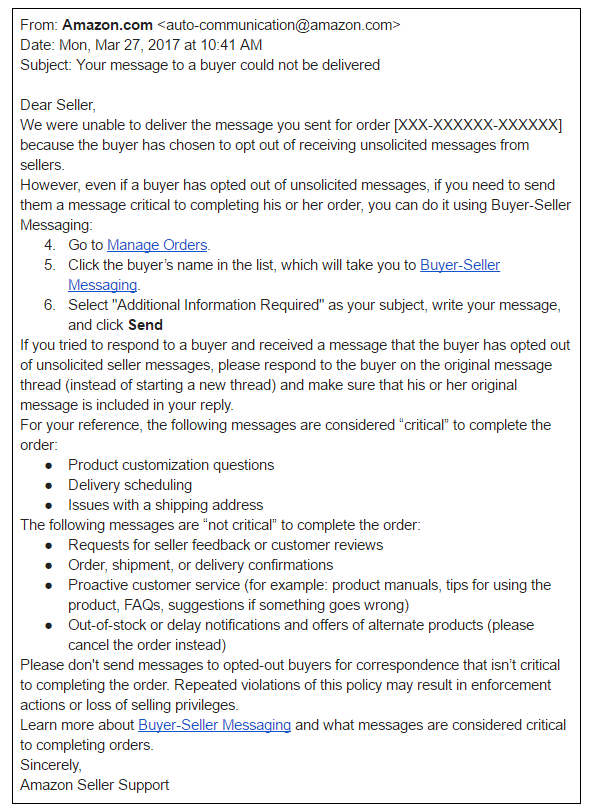 Last week, Amazon made an adjustment to its Buyer-Seller email policy. This is merely an extension of an existing policy that has been in place for some time. The updated policy kicked off Monday, March 27 and was temporarily suspended Friday, March 31 in order for Amazon to make some adjustments.
Last week, Amazon made an adjustment to its Buyer-Seller email policy. This is merely an extension of an existing policy that has been in place for some time. The updated policy kicked off Monday, March 27 and was temporarily suspended Friday, March 31 in order for Amazon to make some adjustments.
Customers already had the ability to opt out of individual seller emails, one at a time. Amazon’s new policy allows them to opt out of all sellers’ emails at the same time with a phone call.
Because of all the confusion (and downright fear) among sellers, I took some time to contact a few third-party email providers as well as a supervisor at Seller Central to get some clarification. Here’s what they had to say.
—————————————————————————-
JEFF COHEN – FEEDBACK GENIUS (SELLER LABS)
—————————————————————————-
“This is a very positive thing and sellers should not be worried. Amazon is finally giving buyers the ability to opt out of messages they don’t wish to receive. A buyer who opts out was most likely not going to write a review or leave feedback anyway. It’s amazing that it took Amazon this long [to extend its opt-out option globally].
“Sellers should remember that emails to customers should be valuable and an enhancement to the buying process. If they are notified from Amazon about a buyer opting out, they should update their blacklist so they don’t email them again.
“Amazon will block any email sent to someone who has opted out. Feedback Genius already has a blacklist and we suggest our users auto-filter the messages to the blacklist as a safety precaution.
“I would also challenge sellers — if they use a system that doesn’t have a blacklist — to be careful. Some software has it; others don’t.”
Jeff also provided me with a quick PDF to show Feedback Genius users how to add customers to their blacklists. Download it here.
—————————————————————————–
JAY LAGARDE – FEEDBACKFIVE (ECOMMENGINE)
—————————————————————————–
“In general, FeedbackFive views this as a positive change. We believe allowing buyers to opt out of unwanted emails helps our sellers get better feedback responses.
“Currently, this opt-out option is only available to Amazon buyers through a phone call to customer support. However, as part of its customer-centric focus, Amazon may add options in its Communications Preferences Center, allowing buyers to specify a preference not to be contacted regarding feedback, reviews, or product information. This could limit emails from both sellers and Amazon. In our eight years of experience with FeedbackFive, we find that the vast majority of buyers do not choose to opt out of receiving positive order follow-up messages.
“As part of Amazon’s careful design of its marketplace, Amazon has always encouraged sellers to deliver outstanding value to customers, and the feedback process is a big part of that. Feedback communications and resolution of concerns are part of the personalized customer service experience Amazon wishes to encourage.
“FeedbackFive is ready for this new rule. Ever since FeedbackFive was started eight years ago, we have been allowing buyers to opt out of receiving notices. The number of requests is fairly low.
“For obvious reasons, most sellers would prefer not to request feedback from someone who does not want to receive those types of communications. You can read more about our Global Opt Out process in an article we wrote last year. FeedbackFive has been the only major tool that honors these opt-outs across our entire user base. So once an Amazon buyer requests to opt out, FeedbackFive removes that customer from all requests, regardless of who the seller is. In addition, our customers benefit from FeedbackFive having the largest base of Amazon sellers compared to any other feedback tool in the industry.
“In cases where we are not aware of the opt-out preference, sellers can simply forward the opt-out notification email to us, and we will ensure that the customer’s opt-out preferences are honored in the future.”
————————————————————
BERNIE THOMPSON – EFFICIENT ERA
————————————————————-
“Amazon knows that some seller-generated emails may be critical to the customer’s order. So they’ve provided an override. By using the specific email title “Additional Information Required,” Amazon lets sellers bypass the opt-out.
“But they don’t want sellers abusing this, so they specified that this bypass is only for critical information, and critical information can only be one of three things: product customization questions, delivery scheduling, and issues with a shipping address. Anything else isn’t considered critical, and abusing this bypass mechanism could result in enforcement actions.
“This new email opt-out mechanism is jarring to sellers, but likely the right step from the customer perspective. It creates uncertainty for sellers who rely on post-order emails to provide support information about the order, since Amazon does not categorize support and product information as ‘critical.’ And obviously, it affects requests for product reviews, etc., but perhaps not as much as you’d think: customers who opted out of emails are probably least likely to review your product based on an email.
“You’ll continue reaching the customers who haven’t opted out, and there are no new restrictions on the content of those emails. And we don’t see any consequence to continuing to send emails to customers who’ve opted out. Amazon will just block those emails. And if the customer opts back in, they’ll stop blocking them.
“Amazon may not be done tweaking here. But overall we, at Efficient Era, believe this email opt-out was well reasoned and balanced the goals of the buyer and seller in a pretty thoughtful way for a new Amazon initiative.”
—————————————————————————–
VIJITA – SUPERVISOR, AMAZON SELLER CENTRAL
—————————————————————————–
After a lengthy conversation that centered around the impact of sellers who receive notifications about emails to sellers that have bounced, Vijita emailed this as confirmation of our discussion.
“Some of the buyers will say they don’t want emails from Sellers.
“Please note that not all the sellers use this service and you won’t suffer because of this because this will not be considered your mistake.
“If a buyer has chosen to opt out (that is, has chosen not to receive communications from sellers), then your emails that you have sent will automatically bounce back, but it will not affect your seller account or your seller metrics in any way.”
Essentially, Vijita was saying that getting a notification that your email to a customer has bounced is not an Amazon slap. Getting these emails will not have a negative impact on your seller metrics in any way. It is simply to let you know that the customer has opted out.
What you must do is to NOT email that customer about this purchase again unless it is something critical to the completion of the purchase (as noted in the email Amazon sends to sellers).
Vijita confirmed that less than 10% of Amazon customers choose to opt out of seller emails.
Here’s a copy of the email Amazon sends if a message is sent to a customer who has opted out of all seller emails.

Frequently Asked Questions
Does getting the (above) email from Amazon mean my account is in trouble?
No. The email is a notification that one customer has requested not to be emailed. If you continue to email this customer about anything besides product customization questions, delivery scheduling, or issues with a shipping address, you will — at that point — be in violation.
Does this mean sellers can no longer ask for reviews or feedback?
No, that is not what this means. During my conversation with the Seller Central Supervisor, she specifically stated that asking for reviews/feedback and sending helpful emails that add to the customer’s experience with your product or offer information they need or want is perfectly acceptable in every case except for those people who have opted out of all seller emails.
You would not know a customer has opted out of emails until you receive a notice from Amazon. At that point, simply add the customer to your blacklist (if the third-party software you’re using doesn’t do that for you) and you’ll be in compliance with Amazon’s new policy.
If I have not gotten an email from Amazon about a customer who has opted out, do I need to do anything?
Just make certain that your review request emails are within Amazon’s terms of service and that they offer useful information, not just a plea for reviews or feedback. See this blog post about common mistakes sellers make with their emails.
 This is precisely why I wrote my newest ebook: “Review Advantage: Email Strategies for Getting More Amazon Product Reviews (Legally!).”
This is precisely why I wrote my newest ebook: “Review Advantage: Email Strategies for Getting More Amazon Product Reviews (Legally!).”
Pick up your copy today and save $10 with coupon code revblog10 (lower case, no spaces).
Do you have other questions about this new policy or about writing review request emails? Ask them below.



I have turned off all of my emails for now.
Although I will concede that it’s possible that continuing to email will turn out to be no big deal, and that it’s just going to be filtered out by the people who don’t want to receive it, I think there is a possibility that we are going to see a much more serious announcement from Amazon about this soon. Sort of like what happened with incentivized reviews.
I am waiting for further guidance directly from Amazon before I email anyone else, because my overall business on Amazon is more important than sending email review / feedback requests.
I think the long term lesson is that if you are selling a product that depends on email to explain the proper use to the customer to prevent bad reviews, you should consider whether it will be safe for your Amazon business to continue to sell products like that. What Amazon really wants is to sell products that are good enough that they don’t require followup.
As a customer, I know I am seriously annoyed when I buy a printer cartridge and I get 5 different emails about it. Amazon order confirmation. Amazon Shipping confirmation. Then the seller sends a “Hey, We are sending you a Printer cartridge!” and then “Your Printer Cartridge has arrived!” and “Please give us a rating and a product review!”
It is this type of seller abuse of the email feature that has caused the filtering to happen in the first place, and no one should ever be sending more than a single email about some stupid minor product. And emails should only be useful, as you also point out.
I don’t think it’s going to be so “easy breezy” when we get clarification from Amazon. I believe the clarification we will eventually get is going to be even more bad news.
I also believe that Amazon is systematically closing down all channels that abusive sellers use to manipulate sales, rankings, feedback and reviews so that they can continue to be known as a trusted platform. That is their goal, and it is important to align with that if you want to be successful there.
It is going to get way worse, and it’s time to Go Pro, or Go Home.
I have said before that I think Amazon will eventually say that they no longer allow review requests by email. All those people who used to use incentivized reviews have now switched to email. That’s causing a huge strain on Amazon’s system and – as you stated – the customers. I buy a lot from Amazon, too, and – as a customer – I also do not like receiving useless emails.
I don’t mind the ones from Amazon confirming my order and letting me know the product shipped. Those are fine. But I do not care for sellers who use the same, exact template every other seller is using to follow-up with me after the order. If you’re going to email me, send me something helpful. Legitimate tips for getting more from your product, useful care/maintenance tips, etc.
And I agree about products that say they have to email customers to explain instructions or other problems so they don’t get bad reviews. Put that information inside your package.
We’ll see. But my gut tells me that – eventually – Amazon will put the brakes on allowing after-purchase emails that ask for reviews.